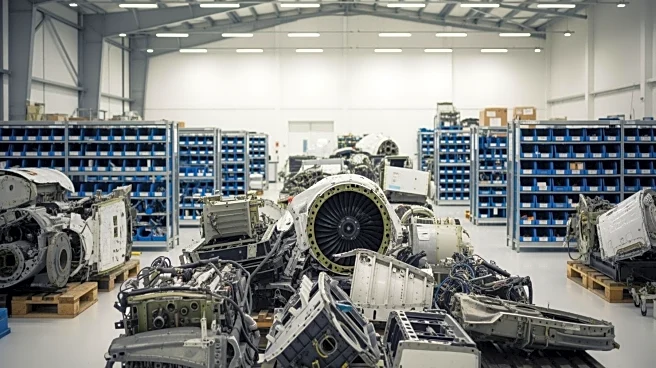What's Happening?
Boeing is enhancing its used parts inventory through a comprehensive aircraft end-of-life program. This initiative involves managing tear downs and part-outs, sharing revenues with customers, and addressing supplier pressure and sustainable end-of-life services.
Under the Aircraft Recycling Program, operators consign soon-to-be retired aircraft to Boeing, which then collaborates with part-out specialists to dismantle the aircraft. Valuable parts are either sold or added to spares pools, with the original operator receiving a portion of the revenue. Boeing's first announced partner in this program is ecube, and the company plans to add more partners, each accredited by the Aircraft Fleet Recycling Association. This program is part of Boeing's broader strategy to support the in-service fleet by increasing its used serviceable material activity and expanding parts pool locations.
Why It's Important?
The expansion of Boeing's Aircraft Recycling Program is significant for several reasons. It helps alleviate pressure on suppliers who are struggling to meet the demand for parts, providing an alternative and sustainable source of materials. This initiative also supports Boeing's commitment to environmental sustainability by offering end-of-life services for retired equipment. Additionally, the program enhances Boeing's ability to support its in-service fleet, ensuring that materials are more readily available to operators. This could lead to improved operational efficiency and reduced downtime for airlines, potentially resulting in cost savings and increased customer satisfaction.
What's Next?
Boeing plans to continue expanding its network of part-out specialists, ensuring each partner carries Aircraft Fleet Recycling Association accreditation. The company is also investing in its inventory and distribution network, with recent expansions including a new warehouse in Cologne, Germany. This move is in response to customer demands for faster turnaround times and localized access to parts. As Boeing continues to develop this program, it may lead to further collaborations and innovations in aircraft recycling and parts distribution.
Beyond the Headlines
The Aircraft Recycling Program may have broader implications for the aviation industry, particularly in terms of sustainability and resource management. By promoting the recycling and reuse of aircraft parts, Boeing is setting a precedent for environmentally responsible practices in the industry. This could encourage other manufacturers and airlines to adopt similar initiatives, potentially leading to a more sustainable future for aviation.
















